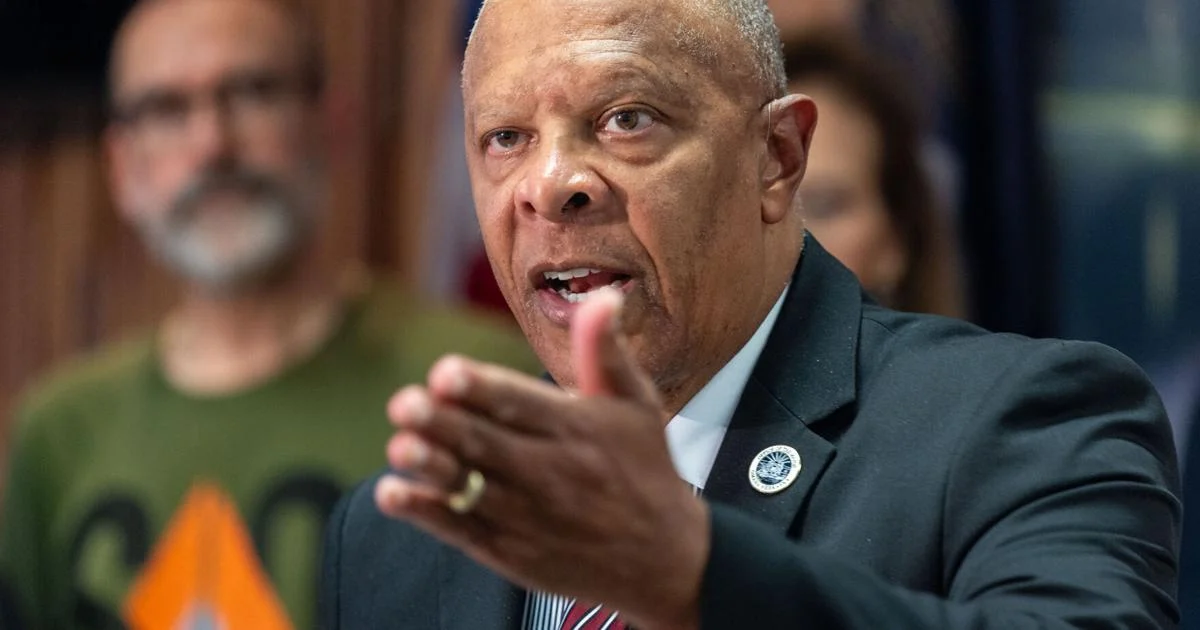
Saying criminalizing homelessness is not the answer, Omaha Mayor John Ewing pushed a plan Monday that would couple more quick removal of homeless encampments with intensive outreach to help those living on the street get help.
Under the proposal, those living in encampments would be given seven to 10 days to vacate. During that time, workers from the city’s dozen homeless outreach organizations, in partnership with the city, would work in a coordinated way to try to get them social services, job support and shelter.
“We believe that adding criminal penalties to those who are homeless is not a humane way to deal with this, and would actually create more problems for them, as well, when it comes to being able to provide them the services and get them to permanent housing,” Ewing said.
Ewing’s proposal came in response to a pending proposal by City Council member Brinker Harding that would make camping on public property in Omaha a misdemeanor crime, carrying a penalty of up to a $300 fine and 30 days in jail.
The Ewing plan also would mark a significant break from current city policy.
Under the plan first devised under the administration of former Mayor Jean Stothert, the city has tended to move in a more measured way, monitoring the conditions in encampments and giving up to two weeks to vacate when officials decide camps need to be cleared.
But Harding said Monday that the seven to 10 days Ewing proposes is still too long, and he suspects it will at times slip to more days than that. There needs to be a more immediate response, he said.
He said he will continue to push his proposed ordinance, which is scheduled for a public hearing before the council Tuesday, with a potential vote on Sept. 30.
“It’s seven to 10 more days of prostitution, or seven to 10 more days of sex trafficking, or seven to 10 days more of human waste adding up, or seven to 10 more days of drug use,” he said. “Those are not going to benefit the people who are in those situations, or benefit the people who are living in and around the areas where that activity is going on.”
Ewing’s administration worked on its proposal with Threshold CoC, the nonprofit that receives federal funding each year to coordinate the Omaha metro area’s response to homelessness.
Ewing and Threshold executive director Jason Feldhaus said they hoped the agencies could get the new program of intensive outreach up and running within 30 days. Then they plan to run it on a pilot basis for up to six months to see the impact it’s having.
Feldhaus and the mayor said they’d like to see the city council hold off on Harding’s ordinance until officials get a chance to see how the pilot is working.
Ewing said he has heard from the public and members of the council that they want a faster response to encampments. He said the city has received 350 encampment complaints since July.
He sold his plan as a measured approach that recognizes the underlying issues that most often lead people to life on the street, including addiction, mental illness, disabilities and the community’s lack of affordable housing.
“You can look anywhere in the country, and you will find that bulldozing encampments and just arresting people has never worked,” said Ewing, standing before more than a dozen representatives of homeless outreach organizations.
“What has worked is when you work to get people in permanent housing, you get them the treatment they need for addictions, you get them the opportunity to be able to get gainful employment.”
Ewing said he has “deep disagreement” with ticketing and arresting the homeless. He said it would distract police officers from other duties, and be expensive, with it costing an average of $170 a day to house a person in jail.
Outreach workers said ticketing people makes it more difficult to get the homeless the help they need. It breaks trust with outreach efforts, they said. Plus, court fines add to financial burdens, and criminal records can make it difficult for people to find a landlord who will rent to them.
Pete Miller, an outreach worker with Threshold, said homeless people also often miss court dates because they don’t have phones, calendars or money, compounding their legal woes.
“It’s a rootless life, and it becomes very challenging,” he said. “It’s not like paying a parking ticket for me.”
Harding said his proposal would both speedily address public concerns while also immediately nudging the homeless to seek help.
The proposed ordinance includes an enforcement mechanism in which the officer issuing the citation would first offer the camper an opportunity to be immediately transferred to a shelter. It also calls for removal of camps within 24 hours.
Harding also questioned the cost of Ewing’s plan. And he said the proposal could put federal funds for dealing with homelessness at risk since it’s just a policy, not a codified plan for dealing with camps.
Listen now and subscribe: Apple Podcasts | Google Podcasts | Spotify | RSS Feed | SoundStack | All Of Our Podcasts
He also criticized Ewing for not working with him on the proposal, not speaking to him since Harding introduced his ordinance weeks ago.
“At the very least, what I have done is brought this to the forefront,” said Harding, who is also a Republican candidate for Congress. “This is a public safety issue and public health issue that needs to be addressed immediately.”
Ewing said his sense is that most council members don’t support the criminalization ordinance, but they do want to see the city move more swiftly.
Omaha in the past decade has seen a sharp increase in “unsheltered” homeless — those living in cars, on the streets or in camps as opposed to shelters or temporary housing.
Due to the difficulty and time required to assess and address unsheltered homeless people’s complex problems and barriers, simply shutting down a camp doesn’t solve the problem, Tamara Dwyer, the city’s homeless services coordinator, has said. It often just pushes the camp to another location.
For that reason, the current city policy has sought to balance community interests with the limitations of resources and compassion for the people driven into homelessness.
The city policy lays out a data-driven system of metrics and point values that determine when an encampment becomes a high priority for action, including where it’s located, the number of people, nearby crime or nuisance complaints, and whether there is trash strewn around.
Even camps scoring low on the metrics have still been subject to regular outreach and efforts to connect individuals with services.
Camps with middling scores are warned to improve conditions within seven days or be given a 14-day order to vacate. High-scoring camps are warned to improve conditions or be subject to a three-day order to vacate.
Ewing acknowledged the public has grown weary of encampments, especially when they continue to crop up in the same places even after removal. They also at times spring up in unsafe places, like along the Keystone Trail.
Under the new approach as outlined Monday, outreach workers would seek to respond to reports of encampments within 24 hours. Those occupying it would be given the seven- to 10-day notice to vacate, with the intensive outreach beginning immediately.
Ewing said one of the problems with the current city approach is that Dwyer and the city’s other outreach worker have been given an “impossible task.” He said Dwyer would now serve in more of a coordinator role, working with the other private agencies, as the new pilot program is implemented.
Feldhaus said the more measured approach taken in the past was in part due to the need to build trust with the homeless. But he said he understands the public’s desire for a faster response and the need to more quickly ramp up services.
“We’re committed to changing those approaches and then making sure, ultimately, at the end of that seven to 10 days, that that camp and that location is closed,” he said.
Feldhaus said implementing the new approach will require outreach organizations to step up, including funding overtime for outreach workers and seeking to provide the intensive services seven days a week.
Among the many organizations working in homeless outreach in Omaha include the Siena Francis House and Open Door Mission shelters, Threshold, the city, St. Vincent de Paul, HEAL Omaha, Charles Drew Health Center, Stephen Center, the Nebraska AIDS Project, the VA, Together Omaha, Community Alliance and Youth Emergency Services.
Feldhaus said the outreach organizations now rely heavily on philanthropic support. He said he was committed to helping to raise the money needed for the pilot.
Ewing also said the pilot program will provide time for his administration to work on a broader plan to deal with homelessness in the long term. That could include finding ways to create more available housing.
Feldhaus said average rents in Omaha have risen 27% in the past three years alone, and the rental occupancy rate is 95%. That makes Omaha one of the most competitive rental markets in the country.
“We need more supportive housing, senior care facilities and physical and mental health rehabilitation options, alongside traditional affordable housing units,” he said. “Shelters remain essential and provide tremendous services, but they cannot always meet the long term housing needs of every individual they serve.”
He also noted outreach efforts took 440 homeless people off the street in the metro area last year, helping contribute to the first decline in Omaha’s unsheltered population since 2018.
Omaha Police Chief Todd Schmaderer has been briefed on the plan and applauded it, Ewing said, calling it a “great plan.”
“Everyone is looking at speeding up their processes so that we have a more timely response for the people who are concerned about encampments,” Ewing said.
cordes@owh.com, 402-444-1130, twitter.com/henrycordes
Get local news delivered to your inbox!
Subscribe to our Daily Headlines newsletter.
* I understand and agree that registration on or use of this site constitutes agreement to its user agreement and privacy policy.
Henry J. Cordes
Reporter – Metro News
Get email notifications on {{subject}} daily!
Your notification has been saved.
There was a problem saving your notification.
{{description}}
Email notifications are only sent once a day, and only if there are new matching items.
Followed notifications
Please log in to use this feature
Log In
Don’t have an account? Sign Up Today



